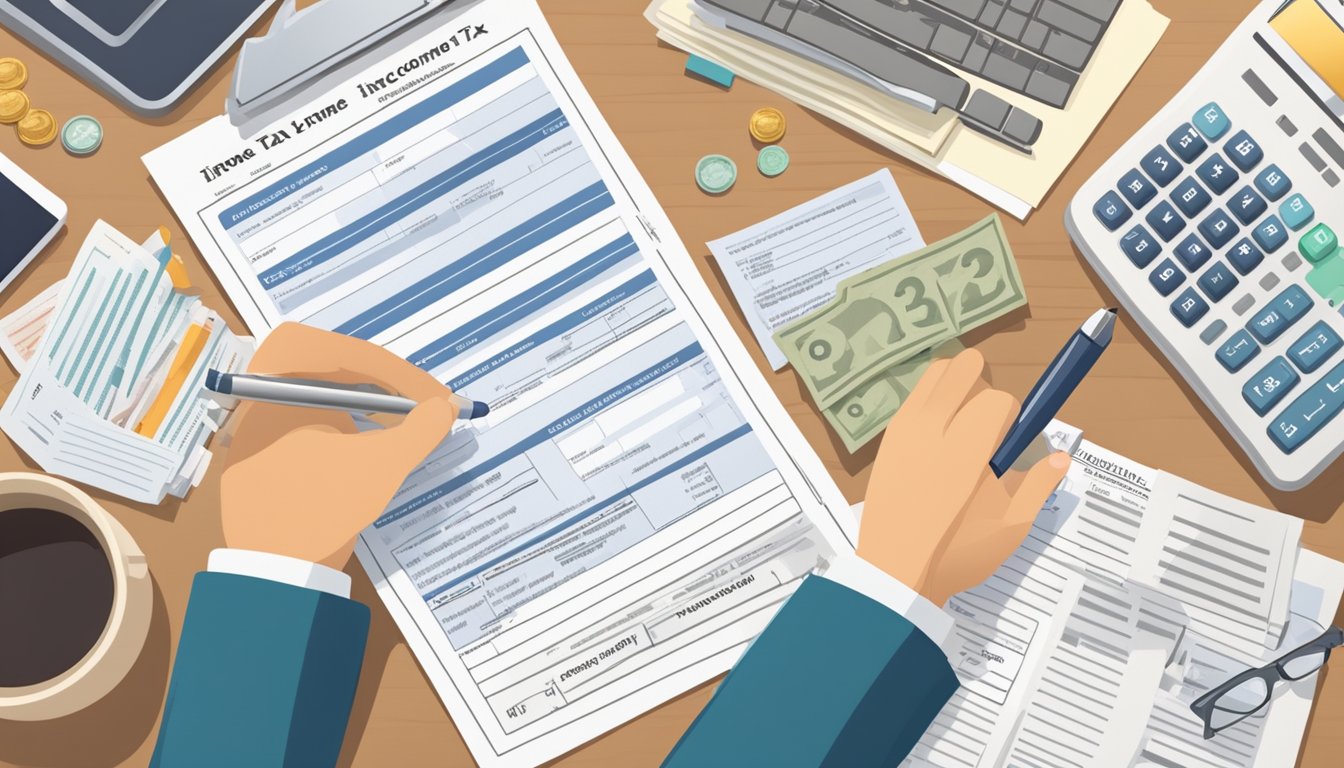Are you interested in learning more about the types of taxes in Singapore involving personal finance? Understanding the different types of taxes you may have to pay is essential for proper financial planning.
Singapore’s tax system is known for being straightforward and transparent, but it can still confuse those unfamiliar.

In Singapore, individuals need to be aware of two main types of taxes: personal income tax and goods and services tax (GST). Personal income tax is a tax on your income, while GST is a tax on the goods and services you purchase. Both of these taxes are important to understand, as they can significantly impact your finances.
Regarding personal income tax, Singapore has a progressive tax system, which means that the more you earn, the higher your tax rate will be. However, there are also various personal reliefs and deductions that you can claim to reduce your tax liability.
Understanding these reliefs and deductions can help you to save money on your taxes and maximise your take-home pay.
1-Min Read: Singapore Taxes (A Quick Guide)
Are you feeling a little lost when it comes to Singapore taxes? Borrowers, this one’s for you (and everyone else)! Let’s break down the basics in under 60 seconds.
Taxes Made Simple: What You Need to Know
Singapore keeps things efficient with a few main taxes. You’ll likely encounter Income Tax, which increases as you earn more. Property owners pay Property Tax based on their home’s value. Everyday shopping? The Goods and Services Tax (GST) is a small addition to most purchases. Drivers, don’t forget about Vehicle Taxes!
There’s More to the Story!
This is just the first page! Singapore has many rebates, deductions, and filing tricks to save money. Intrigued? Stay tuned!
Unlock Your Tax Superpowers!
We’ll dive deeper soon, revealing how to maximise your tax benefits and become a personal finance whiz. We’ll crack the code on filing, hidden deductions, and smart financial choices – all within the exciting world of Singapore taxes.
Get ready to optimise your finances and embark on a tax-saving adventure!
Understanding Singapore’s Tax System

If you are a resident or planning to move to Singapore, it is essential to understand the tax system. Singapore’s government collects revenue through various types of taxes, including personal income, corporate income, and goods and services tax (GST).
Income Tax Fundamentals
The Inland Revenue Authority of Singapore (IRAS) collects income tax from individuals and businesses operating in Singapore. Singapore’s personal income tax system operates on a progressive tax system for residents, ranging from 0% to 22%, while non-residents are subject to a flat rate of 15% to 22%. The tax rate starts at 2% and progressively increases the more you earn, up to 24%.
If you are a resident, you are taxed on all income earned in Singapore and any income earned overseas that is brought into Singapore. Deductions are allowed for expenses incurred in the production of income, such as employment expenses, rental expenses, and donations to approved organizations.
Corporate Income Tax Insights
Singapore’s corporate income tax rate is 17%, and it applies to all companies operating in Singapore. The government provides tax incentives and exemptions to encourage businesses to invest in Singapore. For example, new startups can enjoy tax exemptions on the first S$100,000 of taxable income for the first three years of operation.
The government also offers tax incentives for companies that invest in research and development (R&D) activities. Companies can claim tax deductions of up to 400% of their R&D expenses, subject to certain conditions.
Goods and Services Tax (GST) Overview
GST is a tax on the consumption of goods and services in Singapore. The current GST rate is 7%, which applies to most goods and services in Singapore. GST is collected by businesses and remitted to the government.
Certain goods and services, such as financial services, residential properties, and healthcare services, are exempt from GST. Businesses can also claim input tax credits for GST paid on expenses such as rent, utilities, and supplies.
In conclusion, understanding Singapore’s tax system is crucial for individuals and businesses operating in Singapore. The government collects revenue through various types of taxes, including personal income tax, corporate income tax, and GST. The IRAS collects income tax from individuals and businesses operating in Singapore.
Singapore’s corporate income tax rate is 17%, and it offers tax incentives and exemptions to encourage companies to invest in Singapore. Finally, GST is a tax on the consumption of goods and services in Singapore, and it applies to most goods and services sold in Singapore.
Personal Income Tax

If you are a tax resident in Singapore, you are required to pay personal income tax on your chargeable income. Chargeable income is calculated by deducting allowable expenses and donations from your total income.
Singapore follows a progressive tax system, meaning the higher your tax rate, the more you earn.
Residency and Tax Implications
As a tax resident, you are taxed on all income earned in Singapore, and income earned overseas if it is received in Singapore. Non-residents are only taxed on income earned in Singapore. To be considered a tax resident, you must have stayed or worked in Singapore for at least 183 days in a calendar year.
Tax Rates and Brackets
Singapore’s personal income tax rates range from 0% to 22% (24% from the year of assessment 2024) for tax residents, depending on your chargeable income. Non-residents are subject to a flat rate of 22% (24% from the year of assessment 2024).
Here is a breakdown of the tax rates and brackets for tax residents in Singapore:
| Chargeable Income | Tax Rate |
|---|---|
| First $20,000 | 0% |
| Next $10,000 | 2% |
| Next $10,000 | 3.5% |
| Next $40,000 | 7% |
| Next $40,000 | 11.5% |
| Next $40,000 | 15% |
| Next $40,000 | 18% |
| Next $40,000 | 19% |
| Above $320,000 | 22% |
Allowable Deductions and Reliefs
Singapore offers a variety of tax reliefs and deductions to help reduce your taxable income. Some of the most common reliefs and deductions include:
- Personal reliefs for Singapore citizens, Singapore permanent residents, and foreigners
- Parent/handicapped parent relief
- Spouse relief
- Qualifying child relief
- Grandparent caregiver relief
- Earned income relief
- Supplementary Retirement Scheme (SRS) relief
- CPF relief
- Donations made to approved institutions
It is important to note that not all reliefs and deductions apply to everyone, and there may be specific criteria that must be met to qualify for certain reliefs or deductions.
Overall, understanding the basics of personal income tax in Singapore is crucial for anyone looking to manage their personal finances effectively. Knowing your tax obligations and taking advantage of available reliefs and deductions can minimize your tax liability and maximize your savings.
Corporate Tax Considerations

If you’re running a company in Singapore, you’ll need to be aware of the various tax considerations that come with it. Here are some essential things to keep in mind:
Determining Chargeable Income
A company’s chargeable income is the taxable income subject to corporate income tax. It is calculated by deducting allowable expenses and capital allowances from the company’s total income. It’s important to note that not all costs are deductible, so it’s essential to understand what can be claimed as a tax deduction.
To determine your company’s chargeable income, you must file an Estimated Chargeable Income (ECI) and a Form C-S/ Form C-S (Lite)/ Form C with IRAS every year. The ECI estimates your company’s chargeable income for the year. At the same time, Form C is a detailed tax return that provides information on your company’s income, deductions, and tax payable.
Tax Incentives for Companies
The Singapore government offers various tax incentives to encourage companies to invest and grow. These incentives help companies reduce their tax burden and increase their competitiveness.
One of the most popular tax incentives is the Productivity and Innovation Credit (PIC) scheme, which provides tax deductions or cash payouts for qualifying expenditures in areas such as research and development, automation, and training. Another incentive is the Pioneer Certificate Incentive, which provides tax exemptions for qualifying companies in specific industries.
It’s essential to understand the various tax incentives available to your company and how to qualify for them. These incentives can help you save money and grow your business.
Directors’ Remuneration
If you’re a company director in Singapore, you must pay tax on your remuneration. The remuneration includes salaries, bonuses, and other benefits received from the company.
It’s important to note that the remuneration must be reasonable and commensurate with the director’s duties and responsibilities. The remuneration may be disallowed as a tax deduction if it is deemed excessive.
Conclusion
Understanding the corporate tax considerations in Singapore is essential for any company operating in the country. Knowing the rules and taking advantage of the available tax incentives can reduce your tax burden and grow your business.
Other Types of Taxes

In addition to personal income tax and Goods and Services Tax (GST), you should be aware of other types of taxes in Singapore. These taxes may apply to you depending on your circumstances.
Withholding Tax for Non-Residents
If you are a non-resident individual or company receiving income from Singapore, you may be subject to withholding tax. Withholding tax is a tax on income earned in Singapore by non-residents. The tax is deducted at source by the payer and paid to the Inland Revenue Authority of Singapore (IRAS). The rate of withholding tax depends on the type of income and the tax treaty between Singapore and the country of the non-resident.
For example, if you are a non-resident director of a Singapore company and receive directors’ fees, the company must withhold tax at 22% on the gross fees paid to you.
Property Tax Essentials
If you own a property in Singapore, you will be subject to property tax. Property tax is levied on the annual value of the property. The annual value is the estimated gross annual rent the property could fetch if rented out, excluding furniture, fittings, and maintenance fees.
The property tax rate for owner-occupied residential properties is lower than that for non-owner-occupied and non-residential properties. You can check the property tax rates on the IRAS website.
Estate Duty and Stamp Duties
Estate duty is a tax on the estate of a deceased person. It is payable on the net value of the deceased person’s assets in Singapore and held in his or her name at the time of death. Estate duty is not levied on assets held in trust or jointly owned assets.
Stamp duties are taxes on documents such as property transactions, share transfers, and lease agreements. The stamp duty rates depend on the document type and the transaction’s value.
In conclusion, it is important to know the different types of taxes in Singapore that may apply to you. Withholding tax, property tax, estate duty, and stamp duty are some of the other types of taxes that you should know about. Make sure you understand your tax obligations and seek professional advice if you are unsure.
Tip: Embrace Efficiency
Use digital tools or a simple filing system to keep good records of your income and expenses throughout the year. This streamlines the tax filing process, minimises errors, and ensures you claim all eligible deductions and credits to reduce your tax burden.
Consider leveraging the IRAS’s MyTax portal to automate calculations, manage tax payments, and access past filing information – it’s a one-stop shop for all your tax needs!
Tax Filing Process

Filing your taxes in Singapore is a relatively straightforward process. As a taxpayer, you must submit your tax return every year by 15 April. Here’s what you need to know about the tax filing process.
Navigating IRAS e-Services
The Inland Revenue Authority of Singapore (IRAS) has made it easy for taxpayers to file their taxes online through e-Services. To access these services, you will need to have a SingPass account. SingPass is a digital identity that allows you to access various government e-Services in Singapore. Once you have your SingPass account, you can log in to the myTax Portal to file your tax return.
Understanding the Auto-Inclusion Scheme (AIS)
If you are an employee, your employer may participate in the Auto-Inclusion Scheme (AIS). This means that your employment income and any tax deductions will be automatically included in your tax return. You can view your AIS information on the myTax Portal and make any necessary adjustments before submitting your tax return.
Penalties for Non-Compliance
It is important to note that failure to file your tax return or provide accurate information can result in penalties. Noncompliance penalties can range from a fine to imprisonment for tax evasion. To avoid these penalties, file your tax return on time and provide accurate information.
In conclusion, the tax filing process in Singapore is relatively simple. By using IRAS e-Services, understanding the Auto-Inclusion Scheme, and providing accurate information, you can avoid penalties and ensure that your tax return is filed correctly.
Maximising Tax Efficiency

When it comes to personal finance, one of the most important elements is managing your taxes effectively. By maximising your tax efficiency, you can reduce your tax bill and ultimately keep more of your hard-earned money.
Strategies for Tax Savings
There are several strategies you can use to save on your taxes in Singapore. One of the most effective is to take advantage of tax deductions and reliefs. These are expenses that you can deduct from your taxable income, reducing the amount of tax you owe. Some common deductions and reliefs include:
- CPF Contributions: You can claim tax relief on your CPF contributions, up to a certain limit. This can help to reduce your taxable income and lower your tax bill.
- Education Expenses: If you or your spouse have incurred expenses related to education, you may be eligible for tax relief. This includes expenses such as tuition fees, course materials, and exam fees.
- Donations: Making charitable donations can also help to reduce your tax bill. You can claim tax relief on donations made to approved charities and IPCs.
Another strategy for tax savings is to make use of tax-efficient investment vehicles, such as the Supplementary Retirement Scheme (SRS). By contributing to the SRS, you can enjoy tax relief on your contributions, while also saving for your retirement.
Making the Most of Donations and Deductions
In addition to the strategies mentioned above, there are several other ways to maximise your tax efficiency. For example, you can consider making donations to approved charities and IPCs. Not only will this help to reduce your tax bill, but it will also allow you to support a good cause.
Another way to maximise your tax efficiency is to keep track of your expenses throughout the year. By keeping receipts and records of your expenses, you can ensure that you claim all the deductions and reliefs that you are entitled to.
In conclusion, by taking advantage of tax deductions, making charitable donations, and keeping track of your expenses, you can maximise your tax efficiency and reduce your tax bill. This can ultimately help you to achieve your financial goals and keep more of your hard-earned money.
Special Tax Considerations

If you are an expatriate or foreign employee working in Singapore, you may be subject to different tax rules than locals. It is important to understand these rules to avoid any potential tax penalties.
Tax for Expatriates and Foreign Employees
As an expatriate or foreign employee, you will be considered a non-resident for tax purposes if you have been in Singapore for less than 183 days in a year. Non-residents are taxed at a flat rate of 22% (24% from year of assessment 2024) on all employment income earned in Singapore. However, if you are a resident for tax purposes, you will be subject to graduated tax rates ranging from 0% to 22% (24% from year of assessment 2024) on your employment income. To qualify as a tax resident, you must have been in Singapore for at least 183 days in a year.
Understanding Tax for Self-Employed Individuals
If you are self-employed in Singapore, you will be required to file your taxes annually and pay taxes on your net income. The tax rate for self-employed individuals is the same as the tax rate for employed individuals, ranging from 0% to 22% (24% from year of assessment 2024). However, self-employed individuals are not entitled to any employment-related deductions or reliefs.
Rental Income and Taxation
If you own property in Singapore and earn rental income, you will be required to pay taxes on that income. Rental income is considered taxable income and is subject to the same tax rate as other forms of income, ranging from 0% to 22% (24% from year of assessment 2024). However, you may be eligible for certain deductions and reliefs, such as property tax and mortgage interest.
In conclusion, it is important to understand the tax rules in Singapore if you are an expatriate, self-employed individual, or property owner. By familiarising yourself with these rules, you can avoid any potential tax penalties and ensure that you are paying the correct amount of tax.
Frequently Asked Questions
What are the various categories of taxes applicable to individuals in Singapore?
As an individual in Singapore, you are subject to two main types of taxes: income tax and goods and services tax (GST). Income tax is levied on all sources of income, including salaries, rental income, capital gains, and other investments. GST is a tax on the consumption of goods and services, which is currently set at 7%.
How does one calculate their personal income tax in Singapore?
To calculate your personal income tax in Singapore, you need to determine your taxable income, which is your total income minus any allowable deductions and reliefs. You can then refer to the tax rates provided by the Inland Revenue Authority of Singapore (IRAS) to calculate the amount of tax you owe.
Can you explain the tax reliefs available for residents in Singapore?
Yes, there are several tax reliefs available for residents in Singapore, including reliefs for personal, spouse, and child relief, parent relief, handicapped brother/sister relief, and grandparent caregiver relief. These reliefs can help to reduce your taxable income and lower your overall tax liability.
What is the threshold for salary earnings that obligates one to pay income tax in Singapore?
In Singapore, you are required to pay income tax if your annual income exceeds S$22,000. However, if you are a non-resident, you are only required to pay tax on income earned in Singapore.
For expatriates living in Singapore, how is income tax determined?
For expatriates living in Singapore, income tax is determined based on their residency status, duration of stay, and the source of their income. Non-residents are only taxed on income earned in Singapore, while residents are taxed on their worldwide income.
Is the interest earned on savings accounts considered taxable income for individuals in Singapore?
Yes, interest earned on savings accounts is considered taxable income for individuals in Singapore. However, there are certain exemptions and reliefs available for interest earned on certain types of savings accounts, such as the Central Provident Fund (CPF) Ordinary Account.
Tax Time Crunch? Quick Credit Can Help!
Tax season can be stressful, but Quick Credit Pte Ltd is here for Singapore residents! We’re a reliable money lender offering fast, personal loans to help you manage tax payments.
Why Choose Quick Credit?
- Trusted: Licensed & regulated.
- Fast Approval: Streamlined application process.
- Flexible Options: Loans to fit your needs.
- Transparent Fees: No hidden costs.
- Accessible: Support available islandwide.
Don’t let taxes add stress. Contact Quick Credit and apply for a personal loan today!
